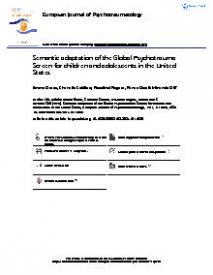Semantic adaptation of the Global Psychotrauma Screen for children and adolescents in the United States
Background: The review of trauma screening tools for children and adolescents indicates a need for developmentally and linguistically appropriate, globally applicable, free, and easily accessible trauma screening instruments.
Objective: The aim of this study is to adapt the Global Psychotrauma Screen (GPS) for children and adolescents in the United States.
Method: Using the modified Delphi method, this study included the GPS Expert Consensus (GPS-EC) and the GPS Stakeholder Consensus (GPS-SC) substudies. In the GPS-EC, ten reviewers who specialize in trauma services independently revised the GPS child and adolescent versions in four rounds. In the GPS-SC, a stratified minimum sample of children and adolescents (n = 24) and their parents (n = 24) were interviewed to collect feedback on the revised GPS versions.
Results: In the GPS-EC Round 1, a low level of consensus was observed on the anxiety (restlessness) and depression (loss of interest) items. In Round 2, a high level of consensus was achieved on all but PTSD hypervigilance and detachment, and CPTSD self-concept items. Round 3 indicated a low level of consensus on the exposure and functioning items. Full consensus was achieved in Round 4 on all items. In the GPS-SC, children had more difficulties than adolescents with the exposure, dissociation, and risk-protection items.
Conclusions: Based on the results of this study, the semantic adaptation process concluded with implementation of six decisions on the final GPS versions for children and adolescents: adding a non-binary gender choice for adolescents; removing the exposure section; using a full-sentence structure for children and a phrase structure for adolescents; retaining the twopart items on PTSD intrusion and avoidance, retaining self-blame but removing other-blame in the PTSD-blame item; providing specific descriptions of depersonalization and derealization in the dissociation items; and removing risk-protection and functioning items for children.
HIGHLIGHTS
• Global Psychotrauma Screen (GPS) is adapted for children and adolescents.
• GPS-Child (GPS-C) for children aged 6-10 years includes 16 items, after removing risk-protection and functioning questions.
• GPS-Teen (GPS-T) for adolescents aged 11-17 years retains 22 items as in the original GPS.
• All items are revised based on the four-round expert and one-round stakeholder reviews and consensus.
In: European Journal of Psychotraumatology ; ISSN: 2000-8198 | 12 | 1 | may | 1911080
https://doi.org/10.1080/20008198.2021.1911080
Open access


